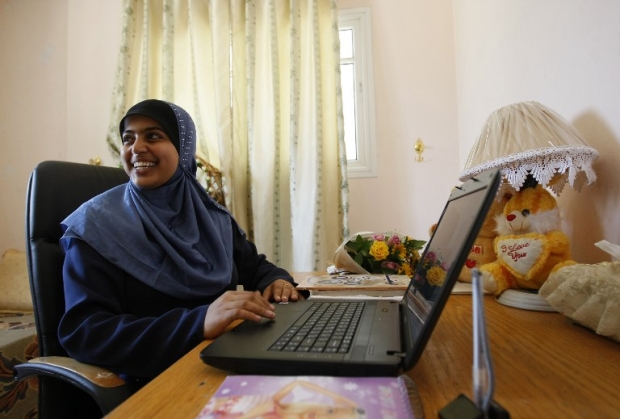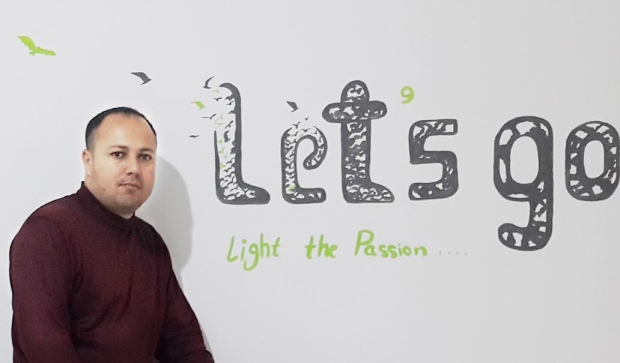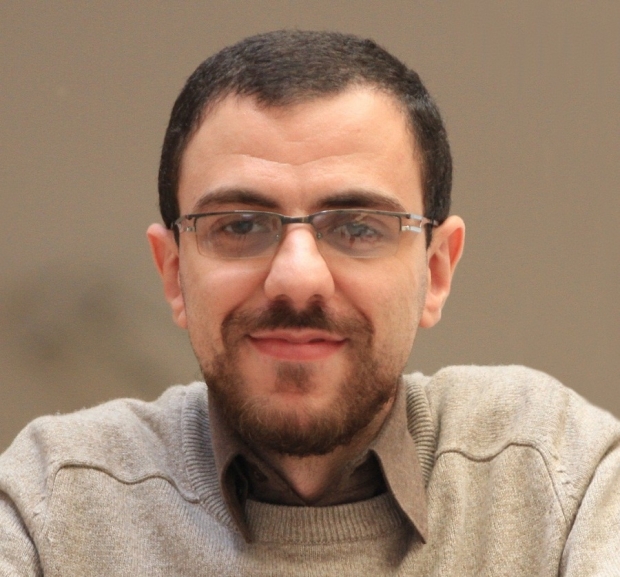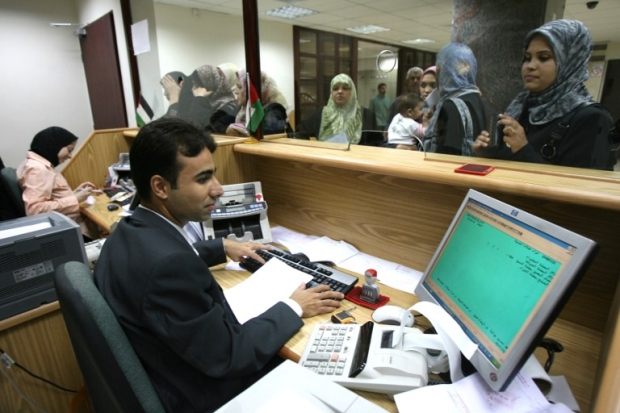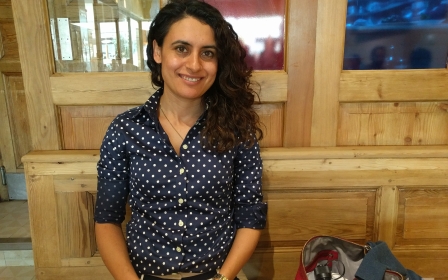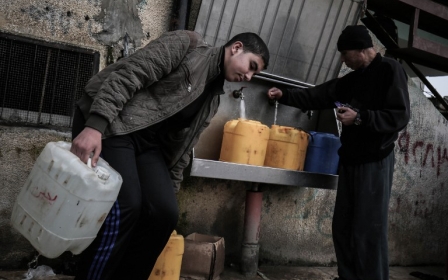Starved for work, Gazans turn to the gig economy
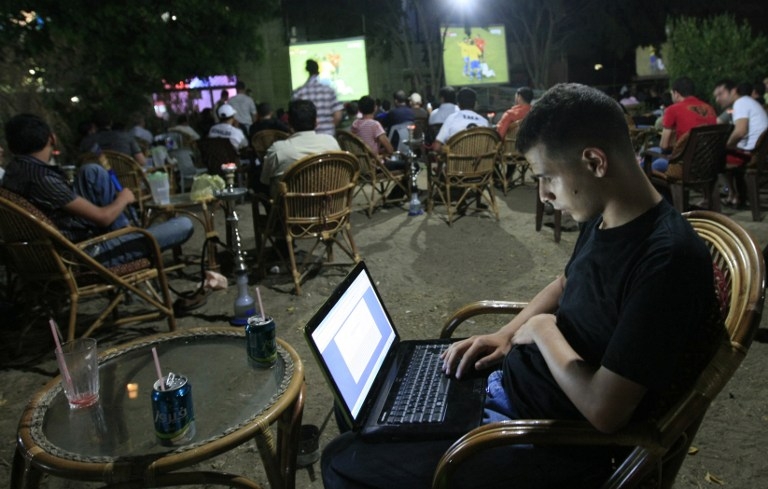
When Dina Nasser graduated from the Islamic University of Gaza in 2015 with a degree in computer engineering, she was about as set as one could be in the crumbling Gaza strip, where youth unemployment recently reached 58 percent.
In 2015, a year after the war with Israel lopped an estimated $1.7 billion off the local economy, jobs were even scarcer than usual. So when Nasser was offered a job unrelated to her skills – writing six articles per day on women’s health for a Saudi company abroad for a paltry salary – she jumped on the opportunity.
Yet the long hours and low pay began to take their toll on her. At one point she reached a monthly income of $300 a month, but only by picking up additional topics, which drove her to work more than 17 hours a day.
'Now my monthly salary varies, but it can reach $2,000 at times… and I have my own clients from Italy, [the] United States, Saudi Arabia, and Dubai'
-Dina Nasser, web designer
Enticed by a higher earning potential and more flexibility, she enrolled in a free programme run by the American NGO Mercy Corps. The initiative trains young Gazans in online freelancing, and within no time she began working as a freelance web designer, often translating websites from English to Arabic for foreign clients.
“I got my first project for $5,” she recalled in a recent interview. “Now my monthly salary varies, but it can reach $2,000 at times… and I have my own clients from Italy, [the] United States, Saudi Arabia, and Dubai.”
'A window of opportunity'
As the Israeli blockade on Gaza continues, the local business community has confronted a rare conundrum: how to harness an unusually well-educated labour force in an economy that is almost entirely shut off from the outside world.
Many are increasingly turning to online freelancing, a sector where brains are more valuable than the material supplies Gazans can barely access, and employers rarely care who does their jobs.
Since 2015, Mercy Corps has run a freelancer training programme out of its local startup accelerator, the Gaza Sky Geeks, which mentors and invests in local entrepreneurs. The three-month programme, in which Mercy Corps employees and volunteers teach skills such as pricing, outsourcing, and finding clients online, has since served hundreds both online and at their Gaza City headquarters.
Most freelancers find work using online platforms, such as Peopleperhour.com or Upwork.com, which match workers with clients for a fee. These sites also allow potential clients to compare freelancers side-by-side, evaluating the cost of a programmer in Gaza against one in Switzerland, who will often charge far more for the same product.
This can give freelancers a substantial leg-up in Gaza, where 63 percent of the population lives on less than $2 a day. Nasser described even $1,000 a month as “every young person’s dream”.
[Earning] $1,000 a month is 'every young person’s dream'
-Dina Nasser, web designer
Abed al-Zain, a local freelance programmer, advertises his services online at $20 per hour, a rate that would place him in the cheapest 10 percent of programmers in the United States, according to the US Bureau of Labour Statistics. Yet he estimates that his income has quadrupled after leaving his old job where he grew frustrated because payment of his frequently delayed salary – $600 a month – was causing intermittent financial problems.
“I think choosing me does not depend on price,” he says. And asked if his clients care that he is in Gaza, he pauses. “They don’t care about our situation… They know the quality of my work.”
‘They don’t care about our situation [in Gaza]… They know the quality of my work’
- Abed al-Zain, Local freelance programmer
But even the most determined proponents of freelancing readily paint it as an “opportunity” rather than a solution to Gaza’s larger unemployment problem.
“Online freelancing is not the solution for Gaza,” explained Taysir Shaqaliah, who manages Mercy Corps’ freelancing programme. “It is just a window of opportunity; it will not fix unemployment in Palestine.”
The perfect marriage, doomed
While it may seem like a perfect marriage – isolated but educated workers and remote jobs that require only expertise – the relationship has in fact been hobbled by many of the same factors that doom Gaza’s larger economy.
“Everything plays together,” explained Rafat Abushaban, a local startup advocate and business leader. “Five things may work, but then one thing puts you back where you started.”
Gaza also experiences frequent power blackouts – often multiple times a day – leading most freelancers to spend money on alternative power sources such as generators or even solar panels.
'They play these games to get money from us'
- Abed al-Zain, local freelance programmer
But for most workers, the biggest issue is how to get paid. Most online freelancing platforms use a third-party service, such as PayPal, to process payments between workers and clients. Citing regulatory barriers as the reason for their limitations, PayPal does not operate in either Gaza or the West Bank, leaving workers to rely on a patchwork of expensive alternatives.
Some rely on wire transfers, yet banks often err on the side of caution by blocking suspicious transactions to Gaza, fearing penalties similar to those incurred by the Jordanian-run Arab Bank in 2015, after an American court found it liable for transferring payments on behalf of Hamas.
“If you make more than $500 in transfers they will start asking questions,” explained Ahmad Elsaidy, a local freelance programmer. “They might just shut you down.”
For those who shun banks, there are no easy solutions. Elsaidy often avoids banking, turning instead to little-known cash cards such as one called the MasterCard Payoneer, which can have costly fees of around 3.5 percent.
PayPal: Salt in their wounds
With banks unreliable and cash cards unaffordable, many freelancers have intricate systems to circumvent both, often out of indignity as much as frugality. “They play these games to get money from us,” explained Zain.
Some use foreign bank accounts, while others send money to family members abroad, often in Jordan, or falsely register PayPal accounts in Israel.
'I’ve been able to plan my future'
-Dina Nasser, web designer
These freelancers are lucky to have accommodating clients. Yet others are not so fortunate, working for clients who insist on more traditional services like Payoneer.
But for all the barriers facing freelancers in Gaza, few cause as much difficulty – or resentment – as their lack of access to PayPal.
In autumn 2016, this anger culminated in a lobbying movement called PayPal for Palestine, in which a group of Palestinian businesses publicly called for PayPal to enter their market, pointing out that it operates in other challenging markets like Yemen.
In a circulated response, PayPal hinted at regulatory barriers: "We continuously work to develop strategic partnerships, address business feasibility, regulatory and compliance needs and requirements, and acquire the necessary local authority permissions for new market entries.”
For the time being, freelancers are doing their best with the status quo, and for all of their difficulties, the rewards are not only financial. “I’ve been able to plan my future,” says Nasser. “And the people around me… they look at me with respect.”
She also knows why. “Because I depend on myself.”
Middle East Eye propose une couverture et une analyse indépendantes et incomparables du Moyen-Orient, de l’Afrique du Nord et d’autres régions du monde. Pour en savoir plus sur la reprise de ce contenu et les frais qui s’appliquent, veuillez remplir ce formulaire [en anglais]. Pour en savoir plus sur MEE, cliquez ici [en anglais].


